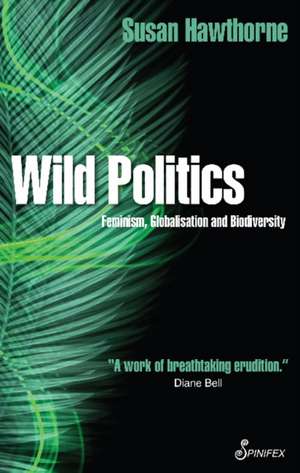Wild Politics: Feminism, Globalisation and Biodiversity
Autor Susan Hawthorneen Limba Engleză Paperback – 29 iun 2022
Preț: 128.55 lei
Preț vechi: 137.37 lei
-6% Nou
Puncte Express: 193
Preț estimativ în valută:
24.60€ • 26.30$ • 20.51£
24.60€ • 26.30$ • 20.51£
Carte disponibilă
Livrare economică 27 martie-10 aprilie
Livrare express 12-18 martie pentru 42.35 lei
Preluare comenzi: 021 569.72.76
Specificații
ISBN-13: 9781925950687
ISBN-10: 1925950689
Pagini: 484
Dimensiuni: 140 x 216 x 20 mm
Greutate: 0.57 kg
Editura: Spinifex Press
Colecția Spinifex Press
ISBN-10: 1925950689
Pagini: 484
Dimensiuni: 140 x 216 x 20 mm
Greutate: 0.57 kg
Editura: Spinifex Press
Colecția Spinifex Press
Recenzii
"A work of breathtaking erudition." -- Diane Bell
"Susan Hawthorne has written an inspiring book, drawing on feminist and Indigenous knowledge to critique global capitalist practice and create a vision of a regenerative world sustaining the environment and its people." -- Prue Hyman, author Women and Economics
"Wild Politics demonstrates that there are richly feminist ways of philosophising ... A powerful feminist sensibility ... informs every line in the book" -- Allan Patience, Australian Book Review
"Susan Hawthorne has written an inspiring book, drawing on feminist and Indigenous knowledge to critique global capitalist practice and create a vision of a regenerative world sustaining the environment and its people." -- Prue Hyman, author Women and Economics
"Wild Politics demonstrates that there are richly feminist ways of philosophising ... A powerful feminist sensibility ... informs every line in the book" -- Allan Patience, Australian Book Review
Cuprins
INTRODUCTION; A Feminist Critique of Western Global Culture; Cultural Logic; Decolonising Scholarship; Biodiversity and Seeds; The Seed of Culture; Weaving the Strands; Defining the Wild; CHAPTER ONE -- The Principle of Diversity; Beginnings; Thesis, Antithesis, Synthesis; Feminism; Change; Creating Feminist Knowledge; Who is the Knower?; Standpoint Theory; Analysis; Synthesis; Dissociation; Associative Thinking; CHAPTER TWO -- Power and Knowledge: Global Monotony or Local Diversity?; Power; The Power of Violence; The Power of Reward; The Power of Backlash; The Power of Obstacles; The Power of Systems; The Power of Attraction; The Power of Attitudes; Knowledge; Assimilation and Appropriation; A Clash of Knowledge Systems; Not seeing; The Perceptual Gap; How Knowledge is Valued; Cultural Homogeneity; In Defence of Diversity; CHAPTER THREE -- One Global Economy or Diverse Decolonised Economies?; The Logic of Neoclassical Economics; How Women Are (ac)Counted; Economic Homogeneity and Globalisation; Decolonising Economics; Feminist Economics; Ecological Economics; Toward a Wild Economics; CHAPTER FOUR -- Land as Relationship and Land as Possession; Land as resource or relationship?; Wilderness; Land; Dealing with Waste; "Freeing" the Land, Enclosing the Commons; Feminist conceptions of land; Indigenous conceptions of land; Land as possession; Tourism: land and wilderness as commodity; Urban land; Urban land as wild space; Steps to developing a wild politics of land; CHAPTER FIVE -- Farming, Fishing and Forestry: from subsistence to terminator technology; Farming in Kenya and Nigeria; Forestry in Lithuania, the USA, Bangladesh and Sri Lanka; Fishing in the Pacific; Digitised and globalised farming: what the future holds; The Kyoto Protocol, plantation forests and Terminator Trees; Fishing wild fish to feed domesticated fish; The commodification of "everything"; Women as keepers of ecosystems; CHAPTER SIX -- Production, consumption and work: global and local; Production and disparity; Consumption and disparity; Work and disparity; Global production; Global consumption; Global work; Local production; Local consumption; Local work; Military as gross producer and consumer; Conclusion; CHAPTER SEVEN -- Monocultures and multilateral trade rules; Patents; Multilateral trade agreements and the shape of international law; Multilateral trade negotiations and the convention on biological diversity; The World Trade Organisation (WTO); Trade related Intellectual Property Rights (TRIPs); Food security; The Multilateral Agreement on Investment (MAI); Traditional Resource Rights (TRRs) and Community Intellectual Rights (CIRs); Human Genome Project (HGP) and Human Genome Diversity Project (HGDP); Conclusion; CHAPTER EIGHT -- Wild Politics; Wild Politics: A vision for the next 40,000 years; Appendix; Tables; 1. Worlds 100 largest economic entities (2001); 2. Companies, countries and name changes; 3. Areas of highest cultural and biological diversity; Glossary; Abbreviations; Bibliography.
